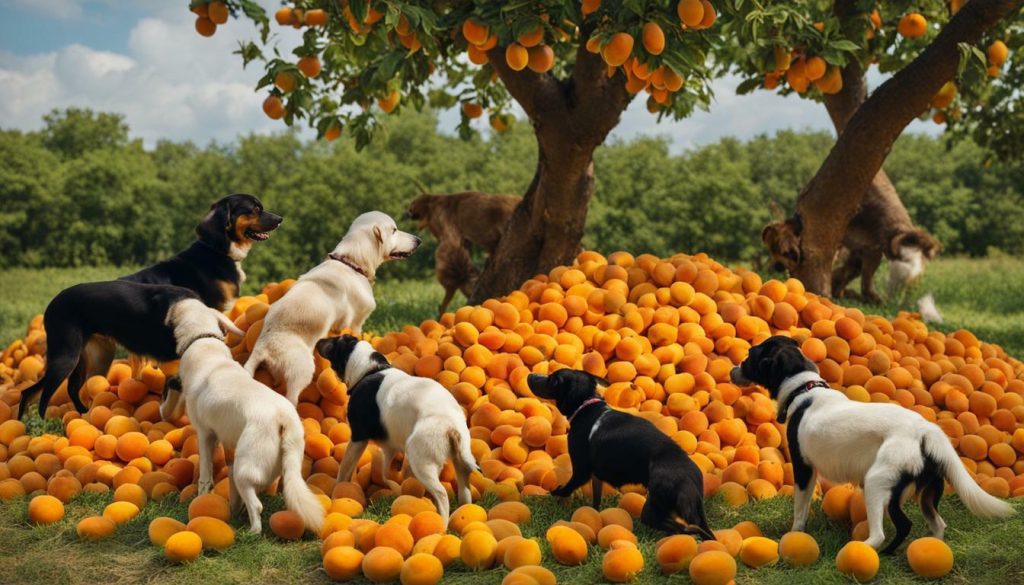
Many dog owners wonder if it’s safe for their furry friends to enjoy apricots as a treat. In this guide, I will address the risks and benefits of feeding apricots to dogs.
Key Takeaways:
- Apricots can be safe for dogs to eat, but certain parts of the fruit are toxic and should be avoided.
- The seeds, pit, leaves, and stem of apricots contain cyanide, which can cause serious health issues in dogs.
- Monitor what your dog eats and keep all food in a secure location to prevent cyanide poisoning.
- Dried apricots should be given in moderation due to their high sugar content and choking hazard.
- Fresh apricots can provide health benefits and are recommended as a treat, not a main meal.
The Pros and Cons of Apricots for Dogs
Apricots offer some potential benefits for dogs, but it’s important to weigh the pros and cons before sharing this fruity treat with your canine companion. Like many fruits, apricots are packed with essential vitamins and minerals that can support your dog’s overall health. They contain high levels of vitamins A and C, which can boost their immune system and promote healthy skin and coat.
Additionally, apricots are a good source of dietary fiber, which can aid in digestion and help prevent constipation. The natural sugars found in apricots provide a quick energy boost, making them a great option for active dogs.
However, it’s crucial to consider the downsides of feeding apricots to your furry friend. The seeds, pit, leaves, and stem of apricots contain cyanide, a toxic substance that can be harmful to dogs. Ingesting these parts can lead to cyanide poisoning, which can cause a range of symptoms such as shortness of breath, increased heart rate, vomiting, seizures, and even death.
| Pros of Apricots for Dogs | Cons of Apricots for Dogs |
|---|---|
| Vitamins A and C for immune health | Presence of cyanide in seeds, pit, leaves, and stem |
| Dietary fiber for digestion | Potential cyanide poisoning |
| Natural sugars for quick energy |
In conclusion, while apricots can offer some health benefits to dogs, it’s crucial to take precautions to ensure their safety. When sharing apricots with your furry friend, always remove the seeds, pit, leaves, and stem. Feed them fresh apricots in moderation, as dried apricots have a higher sugar content and can be a choking hazard. Remember to monitor your dog’s intake and consult with your veterinarian if you have any concerns. By following these guidelines, you can safely incorporate this fruity treat into your dog’s diet and potentially enhance their well-being.

The Dangers of Apricot Seeds and Other Parts
While apricots can be a safe and healthy snack for dogs, certain parts of the fruit can pose serious health risks, particularly apricot seeds, pits, leaves, and stems. These parts contain cyanide, a toxic substance that can cause harm to dogs when ingested. Cyanide poisoning can lead to symptoms such as shortness of breath, increased heart rate, vomiting, seizures, and in some cases, even death. Therefore, it is crucial to keep apricot seeds, pits, leaves, and stems out of your dog’s reach to prevent any accidental ingestion.

If you suspect that your dog has ingested any part of the apricot besides the flesh, it is important to seek immediate veterinary attention. The effects of cyanide poisoning can be life-threatening, and prompt medical intervention is essential. Remember that prevention is key, so ensure that all apricot leftovers and discarded parts are disposed of safely, away from your curious canine companion.
What to feed your dog instead?
If you’re looking for safe and healthy fruit options to incorporate into your dog’s diet, there are several alternatives to apricots that you can consider. Bananas, apples, kiwis, mangoes, and cantaloupe are all fruits that dogs can enjoy in moderation. These fruits provide essential vitamins and minerals, as well as dietary fiber, which can promote good digestion. However, keep in mind that not all fruits are safe for dogs. Grapes, raisins, and tomatoes should be avoided due to their potential toxicity to canines.
| Fruits Dogs Can Eat | Fruits Dogs Should Avoid |
|---|---|
| Bananas | Grapes |
| Apples | Raisins |
| Kiwis | Tomatoes |
| Mangoes | |
| Cantaloupe |
When introducing any new food into your dog’s diet, it is important to do so gradually and in moderation. Always monitor your dog’s reaction and consult with a veterinarian if you have any concerns or questions about what is safe for your furry friend. By being mindful of what your dog eats and avoiding potential hazards like apricot seeds and other toxic parts, you can ensure their safety and well-being.
How to Safely Feed Apricots to Your Dog
If you decide to share apricots with your furry friend, there are a few important guidelines to follow to ensure their safety and enjoyment.
1. Remove the seeds and pit: Before offering apricots to your dog, make sure to remove the seeds, pit, leaves, and stem. These parts contain cyanide, which is toxic to dogs. Cyanide poisoning can cause serious health issues, so it’s crucial to keep them out of your dog’s reach.
2. Moderation is key: While apricots can be a healthy treat for your dog, they should be given in moderation. Fresh apricots are a better option than dried ones, as dried apricots have a high sugar content and can be a choking hazard. One whole apricot per day is a suitable serving size for most dogs, but smaller dogs may benefit from half an apricot.
3. Introduce gradually and monitor for allergies: Just like humans, some dogs may be allergic to certain fruits, including apricots. When introducing apricots to your dog’s diet, start with a small amount and observe for any signs of allergies, such as itching, diarrhea, or vomiting. If any adverse reactions occur, discontinue feeding apricots and consult your veterinarian.
Remember, apricots should be given as treats and not as a main meal. It’s important to provide a balanced diet for your dog, which includes appropriate amounts of protein, carbohydrates, and fats. If you have any concerns or questions about feeding apricots to your dog, it’s always best to consult with your veterinarian for personalized advice.
Benefits of Apricots for Dogs
Apricots are not only a tasty snack for dogs, but they can also provide several health benefits when consumed in moderation.
- Improved digestion: The high fiber content in apricots can aid in digestion and regulate bowel movements.
- Healthier skin and coat: Apricots are rich in vitamins A and C, which can promote healthy skin and a shiny coat for your furry friend.
- Source of antioxidants: Apricots contain antioxidants that help combat free radicals in your dog’s body, potentially reducing the risk of certain diseases.
However, it’s important to remember that every dog is unique, and individual dietary needs may vary. While apricots can be a healthy addition to your dog’s diet, it’s essential to consider their overall health, any existing medical conditions, and consult with your veterinarian before making any significant changes to their diet.
| Safe Fruits for Dogs | Fruits to Avoid |
|---|---|
| Bananas | Grapes |
| Apples | Raisins |
| Kiwis | Tomatoes |
| Mangoes | |
| Cantaloupe |
In conclusion, apricots can be a safe and nutritious treat for your dog when given in moderation and prepared correctly. Keep in mind the potential dangers of cyanide in the seeds, pit, leaves, and stem, and always remove these parts before offering apricots to your furry friend. By following these guidelines and considering your dog’s individual needs, you can safely incorporate apricots into their diet and provide them with a tasty and healthy snack.

Conclusion
Apricots can be a safe and nutritious treat for dogs when given in moderation and with proper preparation. While the flesh of apricots is generally safe for dogs to consume, it is important to remember that certain parts of the fruit, such as the seeds, pit, leaves, and stem, are toxic and should be avoided. Cyanide poisoning can have severe consequences for dogs, including shortness of breath, increased heart rate, vomiting, seizures, and even death. To prevent cyanide poisoning, it is crucial to monitor your dog’s food intake and keep all apricot parts out of their reach.
If your dog ingests apricot seeds or shows any signs of cyanide poisoning, it is essential to seek immediate medical attention. Dried apricots should also be given in moderation, as they have a high sugar content and can pose a choking hazard. Fresh apricots, on the other hand, are a healthier option for dogs and can provide benefits such as improved digestion and a healthier skin and coat.
When giving apricots to your dog, it is recommended to limit their intake to no more than one whole apricot per day, or half of an apricot for smaller dogs. Apricots should be offered as treats and not as a substitute for a balanced main meal. It is also important to remember that there are other fruits that are safe for dogs to eat, such as bananas, apples, kiwis, mangoes, and cantaloupe, while grapes, raisins, and tomatoes should be avoided.
Incorporating apricots into your dog’s diet in moderation can be beneficial, but it is crucial to remove the seeds and carefully monitor their intake. By doing so, you can provide your furry friend with a tasty and nutritious treat while ensuring their overall health and well-being.
FAQ
Can dogs eat apricots?
Yes, dogs can eat apricots, but there are certain parts of the fruit that they should avoid.
What parts of the apricot are toxic to dogs?
Dogs should avoid the seeds, pit, leaves, and stem of apricots as they contain cyanide, a toxic substance.
What are the symptoms of cyanide poisoning in dogs?
Cyanide poisoning can cause shortness of breath, increased heart rate, vomiting, seizures, and even death in dogs.
How can I prevent cyanide poisoning in my dog?
It is important to monitor what your dog eats and keep all food in a secure location to prevent cyanide poisoning. Remove apricot seeds and keep them out of your dog’s reach.
Can dogs eat dried apricots?
Dried apricots should be given to dogs in moderation as they have a high sugar content and can be a choking hazard.
How many fresh apricots can I give my dog?
It is recommended to give dogs no more than one whole apricot per day, or half of an apricot for smaller dogs.
Are there other fruits that are safe for dogs to eat?
Yes, other fruits safe for dogs to eat include bananas, apples, kiwis, mangoes, and cantaloupe. Grapes, raisins, and tomatoes should be avoided.
Can apricots provide any health benefits for dogs?
Apricots can provide benefits such as improved digestion and healthier skin and coat for dogs.
How should I incorporate apricots into my dog’s diet?
Apricots should be given as treats and not as a main meal. It is important to remove the seeds and monitor their intake.






